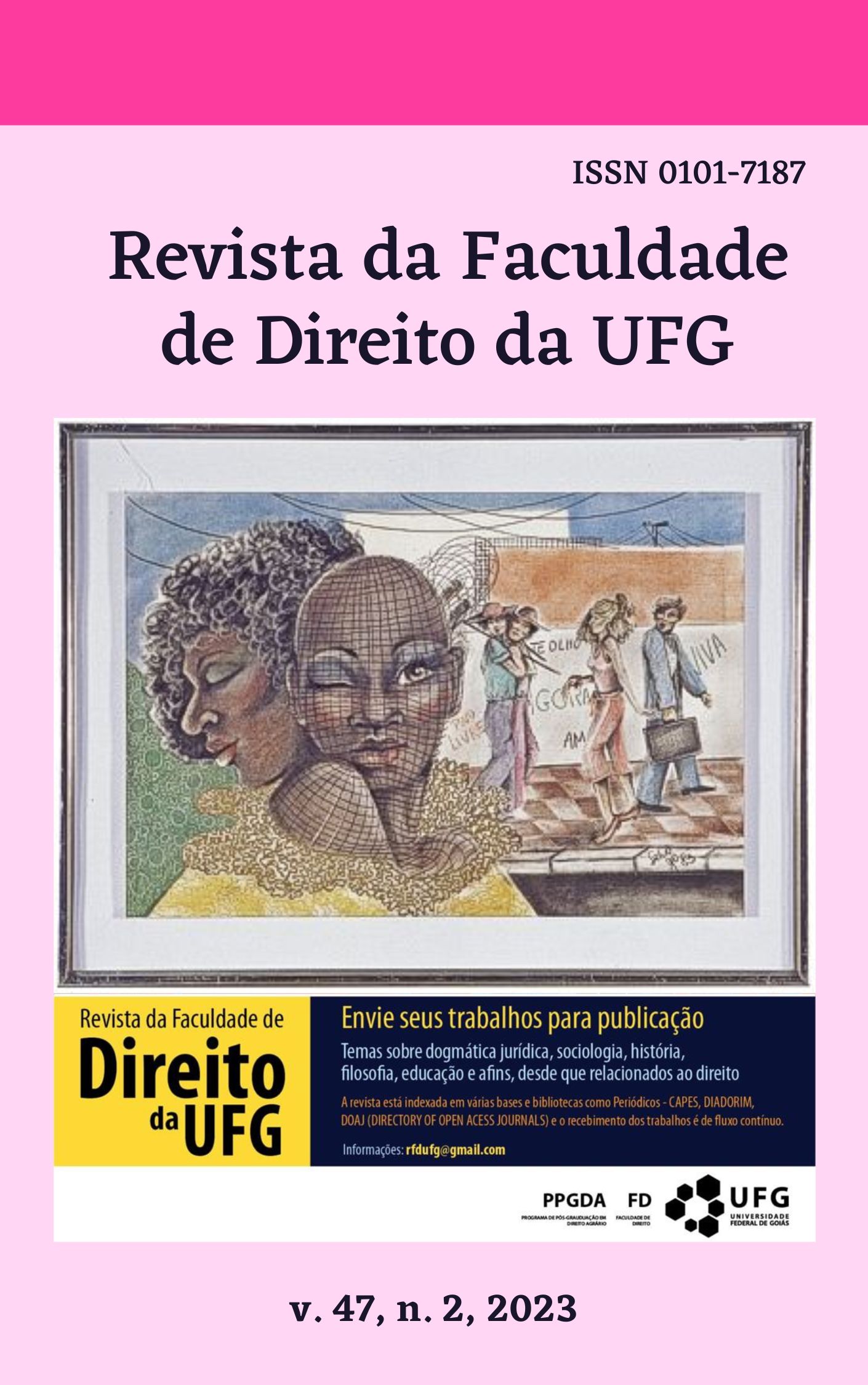CONFLICTING COMPLEXITY AND SELF-COMPOSITIONAL PUBLIC POLICIES FOR JUDICIAL RESOLUTION:
IS IT POSSIBLE TO MEDIATE USER SATISFACTION?
Keywords:
Conflitos, Resolutividade, Satisfação, Autocomposição, Sistema jurisdicionalAbstract
With the present research, we sought to proceed with a diagnosis that could expose the concept of conflict as a social fact and its typologies, while taking into account the satisfaction of users of judicial mechanisms for their adequate treatment. With this, it is intended to clarify whether there are possibilities that the data obtained in evaluative analyzes can be taken into account in the conduct of the judicial public policy for the treatment of conflicts of interest. Therefore, the main objective to be achieved is to analyze the conflicting complexity of current society and its typologies, as well as the satisfaction of the user of the judicial system in these cases. In this, the problem that will be faced during the development of the text originates from the fact that the public policy in question does not have evaluative elements that take into account the complexity of conflicts at the same time as the satisfaction of its users. To examine the proposal, it was decided to use historical, comparative and bibliographic research methods. In the end, it was concluded that the lack of an evaluation that takes into account the satisfaction of users of the appropriate means of dealing with conflicts of interest ends up generating a lack of planning that harms the mechanisms themselves, since there is no scientific basis for that can be adjusted or improved to what is expected of them.
Downloads
References
BAUMAN, Zygmunt. Tempos líquidos. Trad. Carlos Alberto Medeiros. Rio de Janeiro: Zahar, 2007.
BECKER, Daniel; FEIGELSON, Bruno. Acesso à Justiça para além de Cappelletti e Garth: a resolução de disputas na era digital e o papel dos métodos online de resolução de conflitos (ODR) na mitigação da crise de justiça no Brasil. In.: LUCON, Paulo Henrique dos Santos; WOLKART, Erik Navarro; LAUX, Francisco de Mesquita; RAVAGNANI, Giovani dos Santos. Direito, Processo e Tecnologia. São Paulo: Thompson Reuters Brasil, 2021.
BOBBIO, Norberto; et al. Dicionário de política. Vol I.Brasília: Editora Universidade de Brasília, 11ª ed., 2004.
BRASIL. Congresso Nacional. Lei 13.105 de 2015 - Código de Processo Civil de 2015. (2015b). Disponível em:<http://www.planalto.gov.br/ccivil_03/_ato2015-2018/2015/lei/l13105.htm>. Acesso em: 29 jul. 2022.
BRASIL. Congresso Nacional. Lei 13.140 de 2015 - Lei da Mediação. (2015a) Disponível em: <http://www.planalto.gov.br/ccivil_03/_ato2015-2018/2015/lei/l13140.htm>. Acesso em: 29 jul. 2022.
C.N.J. Conselho Nacional de Justiça. Pesquisa sobre a Percepção e Avaliação do Poder Judiciário Brasileiro. (2022) Disponível em: <https://www.cnj.jus.br/pesquisas-judiciarias/pesquisa-sobre-percepcao-e-avaliacao-do-poder-judiciario-brasileiro/>. Acesso em: 27 jun. 2022.
DAHRENDORF, Ralf. Homo sociologicus. Rio de Janeiro: Tempo brasileiro, 1969.
DEUTSCH, Morton. A resolução do conflito. In: Estudos em arbitragem, mediação e negociação. Org. AZEVEDO, André Gomma. Vol. 3. Brasília: Editora Grupos de Pesquisa, 2004. P. 29-52.
MANCUSO, Rodolfo de Camargo. A RESOLUÇÃO DOS CONFLITOS: e a função judicial no contemporâneo Estado de Direito. 3. Ed. rev. ampl. e atual. Salvador: Editora Juspodivm, 2020.
MORINEAU, Jacqueline. L’espirit de la mediation. Ramonville Saint-Agne: Editions Ères, 1998.
PRIEBE, Victor Saldanha. Tempos do direito: a razoável duração do processo sob a ótica do Conselho Nacional de Justiça (CNJ). Santa Cruz do Sul: Essere nel Mondo, 2018.
ROBBINS, Stephen Paul. Comportamento Organizacional. 11ª ed. São Paulo: Pearson Prentice Hall, 2009.
SANTOS, Boaventura de Sousa. A gramática do tempo: para uma nova cultura política. 3. ed. São Paulo: Cortez, 2010.
SIMMEL, Georg, O conflito como sociação. (Tradução de Mauro Guilherme Pinheiro Koury). RBSE – Revista Brasileira de Sociologia da Emoção, v. 10, n. 30, pp. 568-573. Disponível em: <http://www.cchla.ufpb.br/rbse/Index.html>. Acesso em: 20 jul. 2022.
SORRENTINO, Luciana Yuki F. A autocomposição no CPC sob o prisma da arquitetura das escolhas. In: ACESSO À JUSTIÇA: um novo olhar a partir do Código de Processo Civil de 2015. Orgs: Benigna Araújo Teixeira Maia; Fernanda Gomes e Souza Borges; Flávia Pereira Hill; Flávia Pereira Ribeiro; Renata Cortez Vieira Peixoto. Londrina: Thoth, 2021.
SPENGLER, Fabiana Marion; MAGLIACANE, Alessia. Il terzo e l’altro. Verso uma visione simmeliana del conflito.Revista do Direito.Santa Cruz do Sul, v. 3, n. 50, p. 35-53, jan./abr. 2020. Disponível em: <https://online.unisc.br/seer/index.php/direito/index>. Acesso em: 20 jul. 2022.
TJMG. Tribunal de Justiça do Estado das Minas Gerais. Total Avaliação de Satisfação 2021.Disponível em: <https://novoportal-hml-1.tjmg.jus.br/portal-tjmg/acoes-e-programas/conciliacao-mediacao-e-cidadania.htm#>. Acesso em: 28 jul. 2022.
VEZZULLA, Juan Carlos. Mediação: guia para usuários e profissionais. Florianópolis: Instituto de Mediação e Arbitragem do Brasil, 2001.
ZAPAROLLI, Célia Regina. Negociação, Mediação e Arbitragem. São Paulo: Método, 2012.
Downloads
Published
How to Cite
Issue
Section
License
Os Autores que publicam nesta revista concedem à Revista da Faculdade de Direito da UFG uma licença mundial, sem royalties, sujeita aos termos e condições da Licença Jurídica Creative Commons Atribuição 3.0 Brasil Creative Commons Attribution License
Os autores concedem à RFD UFG todos os direitos autorais sobre os artigos nela publicados, que os mantêm com exclusividade até o advento de domínio público sobre os mesmos.
























